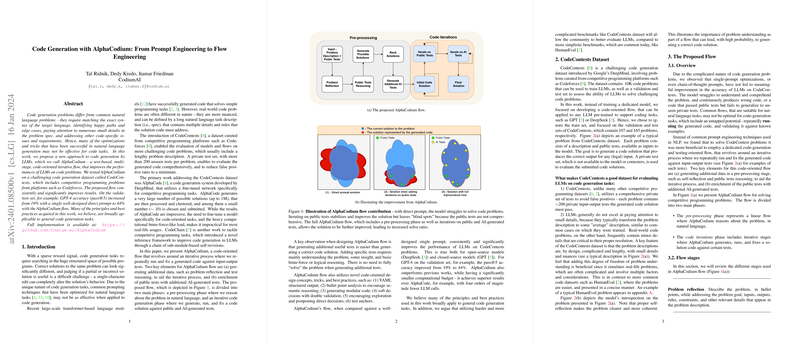Introduction
The paper at hand introduces a new methodology called AlphaCodium, a multifaceted approach to enhancing code generation by LLMs. Code generation tasks differ fundamentally from common natural language tasks, as they require a nuanced understanding of intricate problem specifications and adherence to exact programming language syntax. AlphaCodium addresses these challenges by implementing a test-based, multi-stage, iterative process tailored specifically for code generation. This methodology not only boosts performance on challenging datasets but also introduces practices that are broadly relevant to code generation tasks in general.
The Challenge of Code Generation
The complexity of code generation lies in the various elements it involves: matching target language syntax, identifying optimal paths, and managing edge cases, among other things. Previous optimization techniques used for natural language processing don't necessarily translate well into this context. The paper highlights the CodeContests dataset, initially introduced by Codeforces, as a robust tool for evaluating AI models on complex code problems. This dataset offers intricate problem descriptions and a diverse array of examples to accurately assess generated code solutions.
AlphaCodium's Novel Approach
AlphaCodium's two-phase process begins with a pre-processing stage where the model reasons about a coding problem using natural language inputs. The subsequent iterative phase involves the generation, execution, and refinement of code solutions against a combination of public and privately-generated tests. A key insight is that generating additional AI-driven tests -- focused on areas not covered by the public tests -- is critical for iteratively refining code solutions.
Key Design Principles
The methodology utilizes code-oriented design principles such as YAML structured output for ease of output interpretation and modular code generation for simplification and enhanced bug resolution. It encourages semantic reasoning, soft decision-making, and exploratory techniques over direct questioning. This method of prompting the model to incrementally build upon information aids in producing higher quality code output. Additionally, the technique of "test anchors" is employed to mitigate against incorrect AI-generated test cases.
Conclusion
AlphaCodium's proposed flow was tested on the CodeContests dataset and yielded substantial improvements in performance across different models. Compared to single prompt trials, AlphaCodium nearly doubled GPT-4's accuracy on the validation set. The approach achieves comparable -- if not superior -- results to existing methodologies, such as AlphaCode, but with substantially less computational overhead, which enhances its practicality for real-world applications. The principles gleaned from the development of AlphaCodium could hold significant implications for future code generation tasks, potentially aiding in the creation of more reliable, efficient solutions.
